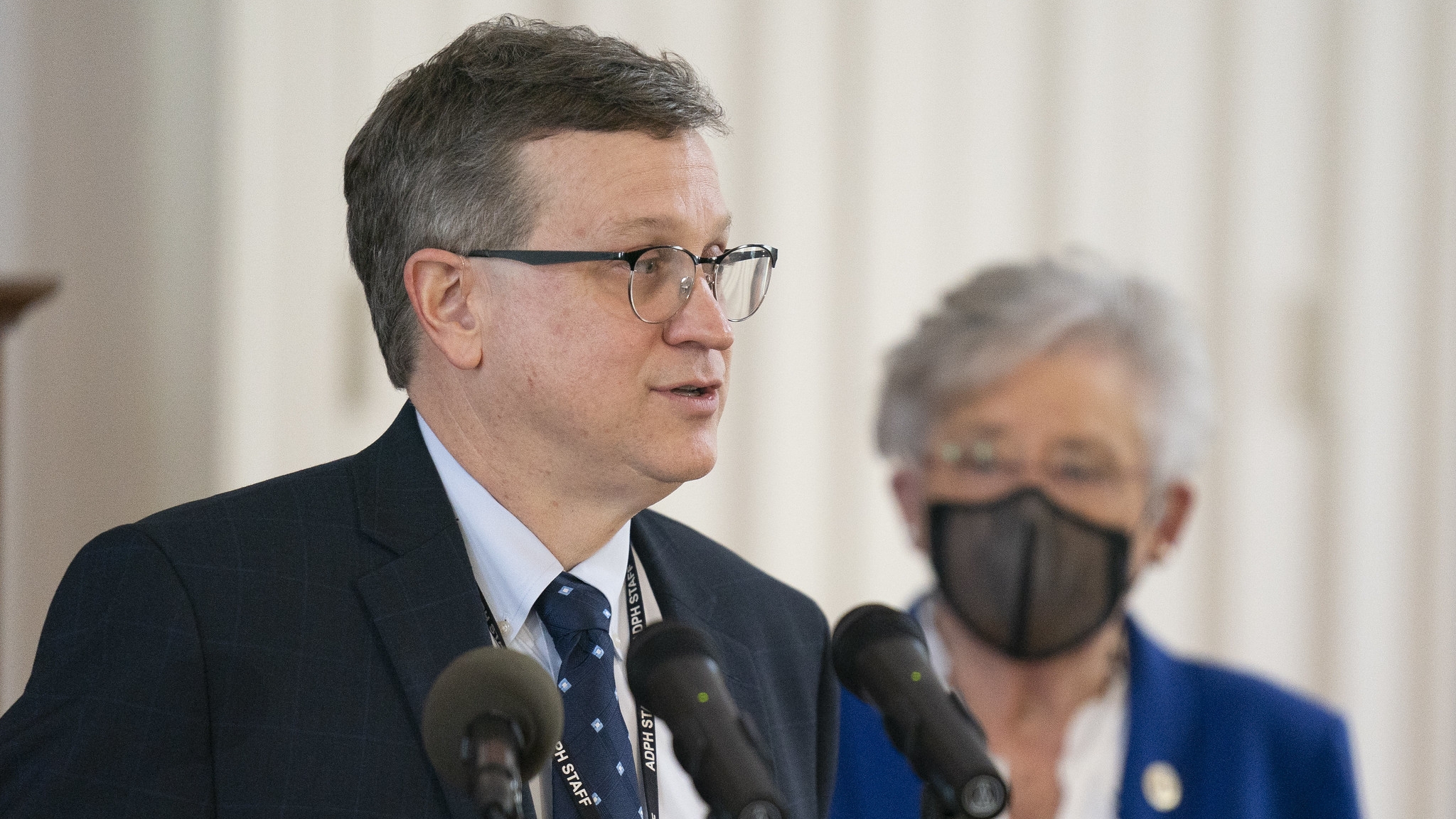Gov. Kay Ivey on Thursday extended her statewide mask mandate, set to expire Friday, until March 5, but the state’s supply of COVID-19 vaccines remains too low to expand vaccinations to all who want them, according to the state’s top public health official.
Alabama State Health Officer Dr. Scott Harris, speaking at a press briefing with Ivey on Thursday, said that he understands the public’s concern at the slow pace of vaccinations, but said the problem is one of a lack of vaccine supply from the federal government.
“The mask mandate remains the one step that we can all take in order to keep some balance in our daily lives to stay healthy and safe,” Ivey said, before announcing the extension of her “safer-at-home” order, without changes.
“At one point last week of the 1,600 ICU beds in our state, 1,561 were occupied,” Ivey said. “Folks, that means that only 39 ICU beds were available for COVID-19 or cancer patients, or folks involved in severe accidents.”
Ivey encourages the public to wear masks, practice social distancing and hand hygiene, and said that Harris and his team are “working around the clock to get shots in arms” and called on the public to be patient as vaccinations continue.
“Unfortunately, we simply do not have enough vaccine for everyone who wants one. In fact, no state does,” Ivey said.
Harris said the Alabama Department of Public Health has registered 502 sites across the state, which are now eligible to receive and administer vaccines, but said just a little over half of those have received vaccines “because we simply don’t have enough to go around.”
“Our county health departments, who are doing vaccinations, are under instructions now to do vaccines all day, every day until they run out,” Harris said.
As of Thursday morning, 202,643 doses have been administered statewide, Harris said, which is approximately 42 percent of the state’s supply.
“That’s about 70,000 more than the federal government has said that Alabama has given,” Harris said, noting reporting problems some entities have had getting that data to the federal government.
Harris said many of the state’s doses currently in supply are for required second doses, and can’t be used for first shots.
“Alabama hospitals by-and-large are out,” Harris said. “The only doses they have are those that are remaining for second doses, or in some cases, appointments for first doses,” Harris said.
To speed up vaccinations, ADPH this week began reviewing whether to move doses from entities that aren’t vaccinating fast enough to those that need and can administer the doses more quickly, Harris said.
“We’re going to give each provider a week for each shipment that they receive, and they are expected to administer the majority of that, and if not, we’ll make a determination about whether their vaccine needs to go somewhere else,” Harris said.
Harris discussed a federal plan, announced by the Trump administration and carried forward by President Joe Biden’s team, for chain pharmacies to vaccinate the public with doses supplied by the federal government, but said that program isn’t yet ready to roll out.
To speed things in Alabama, Harris said ADPH has partnered with Walmart pharmacies to begin using some of the state’s supply, as it comes in, to vaccinate the public.
“The exact numbers are still being worked out, but we’ll have say-so in public health about where in the state those doses go, so that we can make sure we get them to those parts of the state that need them the most,” Harris said.
Harris said ADPH’s online portal for the public to schedule for vaccinations should be online “In the next few days” and said there’s been a great deal of frustration over the department’s scheduling hotline, which has been inundated with calls.
“We actually have 165 phone lines that are being answered,” Harris said, adding that more than half of those calls are from people who aren’t currently eligible for vaccinations.
Currently, the state is vaccinating a subsection of ADPH’s phase 1b, including those aged 75 and older, police and firefighters. Medical workers, who are covered in phase 1a, are also still being vaccinated.
Some Alabama counties have moved on more fully into phase 1b, which include more frontline essential workers and those living in group settings. ADPH has left the decision to move on up to individual counties.
Harris discussed upcoming changes likely to come from the Biden administration, and said while he doesn’t have a clear picture of how expanded production of vaccines is going to happen, ADPH has had many talks with Biden’s transition team about the possibility of expanding vaccinations to those 65 and older.
“If it’s ultimately determined that the group of Alabamians 65 and older should be in the next eligibility group, that’s about 500,000 people in Alabama,” Harris said. “So half a million more people are going to hear the message that it’s time for them to get their vaccine, and of course they’re absolutely deserving, and we will get it to them as quickly as possible, and yet the amount we’re getting in the state each week is not going to change.”
“Our allotment is between 50,000 and 60,000 doses a week. We’ve been told it’s not going to change anytime soon,” Harris said.
Biden on Thursday released his national strategy to address COVID-19, which includes using the Defense Production Act to speed manufacturing of supplies needed for vaccinations, and for the purchase of additional FDA-approved vaccines. The plan also calls for the federal government to create more venues for vaccinations nationwide, to include “stadiums and conference centers” and well as mobile and on-site occupational clinics, pharmacies, retail stores and urgent care centers.
“For almost a year now, Americans could not look to the federal government for any strategy, let alone a comprehensive approach to respond to COVID. And we’ve seen the tragic costs of that failure,” said White House coronavirus coordinator Jeff Zients in a briefing Wednesday.
Biden is expected to sign 10 executive orders Thursday focused on tackling COVID-19.

















































